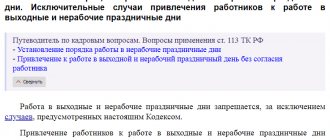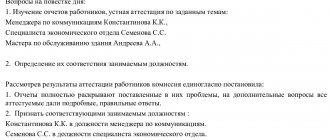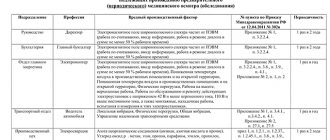20.08.2019
0
200
5 minutes.
A medical examination is mandatory for all employed citizens during employment, and after a certain amount of time. For example, for office clerks involved in safe activities, the planning commission should be carried out no more than once every 2 years, just like for drivers of category B or C. But Art. will tell us what period is provided for people working in difficult conditions. 213 of the Labor Code of the Russian Federation.
Article 213 of the Labor Code of the Russian Federation: medical examinations of certain categories of workers
Art. 213 of the Labor Code includes a description of certain categories of workers whose activities are associated with the following harmful factors:
- Processing and storage of hazardous substances of the group: hazardous substances, VVZ, SDYAV, or BOV;
- Quality control of the food industry and the production process in public food places;
- Provision of medical services (this also includes employees of individual healthcare structures whose activities are aimed at protecting the population from viral pathologies and preventing epidemics);
- Organization of children's events (employees of educational institutions fall under this category).
It is important to know! Unlike ordinary workers, the listed categories of persons are required to undergo a medical examination at least 1-2 times a year. What is included in the list of diagnostic procedures according to Art. 213 of the Labor Code, and where it is necessary to carry out an inspection, we will find out further.
Medical examination concept
A medical examination is a set of diagnostic procedures aimed at examining a person’s health status. When hiring, such a check is simply necessary and is carried out in order to prevent accidents at the enterprise. Examination is carried out by the following doctors:
- Otolaryngologist;
- Oculist;
- Radiologist (for fluorography);
- Neurologist;
- Psychiatrist;
- Venereologist, dentist and dermatologist (these specialists are needed only for those citizens who work in areas that require direct contact with people: cosmetologists, hairdressers, cooks, etc.);
- Gynecologist;
- Cardiologist.
The professional suitability form, in accordance with Article 213 of the Labor Code of the Russian Federation, must be signed by a therapist who is responsible for issuing referrals at each examination.
The medical examination itself is divided into three main types: scheduled, extraordinary and daily. The first type is assigned to all employed citizens upon reaching the established period of service. The second diagnosis is necessary when there is an increased risk of an epidemic and can cover both the entire team and a small part of it. Daily inspection is established only for drivers, electricians, railway workers, miners and aircraft employees.
Categories of workers requiring medical examination
According to the legislation of the Russian Federation, routine examination is necessary for all employed citizens, regardless of their position and length of service. But Article 213 of the Labor Code of the Russian Federation identifies a special list of workers who need more frequent professional examination. This includes:
- Employees of factories and enterprises whose activities involve the processing and storage of hazardous substances;
- Subordinates serving in dangerous conditions;
- Employees related to the organization of public catering;
- Staff of medical institutions (both private and public);
- Employees of educational institutions (schools, universities, technical schools, etc.);
- Agricultural workers.
If we are talking about a primary medical examination conducted before employment, then it is mandatory only for the following categories of persons:
- Subordinates under 18 years of age;
- Citizens applying to perform hazardous work;
- Drivers and machinists of all categories;
- People who are professionally involved in sports.
In this case, initial and routine inspections are carried out exclusively at the expense of the enterprise. But the staff can only bear the cost of the examination related to the individual characteristics of their body.
Frequency
Each scheduled medical examination for citizens listed in Article 213 of the Labor Code is carried out at least once a year. If we are talking about an unscheduled check of the health status of personnel, then it can be carried out several times a month, depending on the initial reasons for its organization (epidemic, suspicion of a viral infection, etc.).
Attention! The last, daily type of medical examination is carried out no more than once a day - at the beginning or end of the work shift. But, unlike a routine examination, it includes only a superficial examination, which can be carried out by the doctor on duty at the enterprise or a nurse.
Categories of employees required to undergo medical examinations in accordance with the Labor Code of the Russian Federation
Some employees, due to the specific nature of their job duties, must undergo medical examinations.
These include, first of all, those listed in Art. 213 Labor Code of the Russian Federation workers. Firstly, these include persons working in harmful and/or dangerous conditions, which means:
- At work there are harmful or dangerous factors included in a special list, which is contained in Appendix No. 1 to the Order of the Ministry of Health of the Russian Federation “On approval of lists of harmful and (or) dangerous factors ...” dated April 12, 2011 No. 302n (hereinafter referred to as Order No. 302n). These can be biological, physical, chemical factors or labor process factors (for example, physical activity).
- The work itself is dangerous by its nature and is included in the corresponding list (Appendix No. 2 to Order No. 302n). For example, this includes work at heights and work at explosive sites.
Secondly, persons working in the field of transport are subject to mandatory medical examinations. The list of such employees was approved by the Government of the Russian Federation (Resolution No. 16 dated January 19, 2008). This includes both persons directly managing transport and other workers whose work is related to the movement of transport: dispatchers, operators, attendants, etc.
Thirdly, employees are required to undergo medical examinations:
- enterprises, trade, catering, food industry;
- children's institutions;
- medical organizations;
- waterworks.
ConsultantPlus has many ready-made solutions, including how to organize periodic medical examinations for drivers. If you don't have access to the system yet, you can sign up for a free trial online! You can also get the current K+ price list.
Who should undergo a psychiatric examination?
The column “psychiatric examination” is present by default in all bypass forms. But, according to the resolution of the Ministry of Health No. 377, only those workers whose activities are related to the following criteria should undergo this diagnosis:
- High-rise work (maintenance of multi-storey buildings, cranes, etc.);
- Installation of electrical equipment with a power of more than 127 V;
- Excavation of oil and gas springs;
- Transporting cargo or passengers;
- Maintenance of technical means of transportation (cars, trains, airplanes, etc.);
- Deforestation and further wood processing;
- Protecting order, objects or citizens;
- Pyrotechnicians, sappers and other persons in contact with explosives;
- Lathes and milling machines;
- Production and supply of food products;
- Providing medical care;
- Raising children and organizing the educational process;
- Prevention of sanitary and epidemiological problems;
- Agricultural industry;
- Maintenance of hotels or hostels;
- Purification and supply of water;
- Processing and sale of narcotic substances.
The remaining categories of employees are not required to undergo a psychiatrist during a routine check-up or before drawing up an employment contract. This is also confirmed by Order No. 302 of the Ministry of Social Health.
Regular psychiatric examination of some employees
In Part 7 of Art. 213 of the Labor Code of the Russian Federation establishes special requirements for monitoring the health status of workers whose activities are associated with increased danger and/or harmful substances and poor production factors. Such employees must undergo regular examinations by a psychiatrist.
The types of work that require such examinations are determined by the Decree of the Government of the Russian Federation “On the implementation of the law “On Psychiatric Care...”” dated April 28, 1993 No. 377. In particular, these include work involving exposure to harmful chemicals (for example, production and other processes associated with the release of amino acids) and physical factors (for example, working in conditions of constantly increased/lowered air temperature, physical overload).
The purpose of such events is to determine the suitability of employees to perform their duties, which require sobriety of mind, attention and concentration. The examination is carried out before entering work (along with a preliminary medical examination, which, as a rule, is also mandatory for such employees), and then at least once every 5 years.
Organization of medical examinations
Despite the fact that a routine examination is carried out for all employees, at least 1-2 days must be spent on this procedure. After all, it consists of several difficult steps. Namely:
- Choosing a medical institution where the staff’s health will be checked (Usually the company chooses the clinic for a medical examination. But in case of disagreement, the subordinate reserves the right to contact the company that he trusts. The main thing is that it has the appropriate accreditation);
- Drawing up a list of employees who were subject to a scheduled or extraordinary inspection (responsibility for keeping it up to date rests with the doctor on duty);
- The resulting list is agreed upon with Rospotrebnadzor, and only after this the medical institution can enter into an agreement with the specific employer who sent the staff for examination;
- The clinic draws up an action plan for employed citizens within 1-2 months, and transfers the finished document to their manager;
- The management introduces the subordinates to the schedule according to which they will have to undergo examination;
- 2 weeks before the medical examination, employees are given directions containing all the information they need (full names of doctors, name of organization, etc.);
- The staff visits all specialists and confirms the bypass form with the therapist;
- One copy of the finished document is entered into the subordinate’s personal card, and the second is transferred to his employer.
It is important to know! If the scheduled inspection is ignored, this may result in the imposition of a fine on the culprit or termination of the employment contract with him on the initiative of the boss.
What types of medical examinations are there and what do they depend on?
Preliminary examinations are carried out upon hiring. They depend on the conditions in which the new employee will work, and are designed to determine the compliance of his health with the professional requirements.
Periodic inspections are carried out during operation. Their necessity is usually determined based on industry requirements and the results of an assessment of working conditions. Designed to monitor the health status of workers and the risks of occupational diseases.
Extraordinary examinations may be scheduled in addition to periodic ones. They are usually associated with the identification of some additional factor (factors) that may affect the physical condition of workers, which is why they are also called target ones.
Daily (shift) examinations are practiced for those categories of workers who have the highest following occupational risks:
- risk of self-harm;
- risk of harm to others;
- risk of causing significant material damage.
Including (but not limited to) inspections every working day (shift) are required during work:
- at electric power facilities;
- directly related to the movement of railway transport;
- underground;
- in aviation - as part of aircraft crews and in the ground control group (control room).
The procedure for conducting a medical examination at the enterprise
The procedure for undergoing a medical examination is regulated by federal legislation and orders of the Ministry of Health and the Chief Sanitary Doctor, and other norms of regional legislation.
When applying for a job, the company does not have the right to require a medical examination in a specific clinic. A person can independently decide where to undergo the test, or leave the organization of the medical examination to the enterprise, since both parties are interested in this procedure. If a company enters into an agreement for a medical examination of employees, the examination process will be simple and quick, eliminating tedious queues and obtaining coupons.
The law does not require the choice of a state medical institution, so for medical examinations they often prefer paid clinics that have the appropriate certificates and licenses.
After the employer reports a positive decision to hire a person, the details of subsequent employment are agreed upon. As a rule, every enterprise knows very well who should undergo medical examinations and in which cases they are not necessary.
The procedure then proceeds in the following sequence:
- Receiving a referral from the employer, signed by the manager or person who should carry out the medical examination in the organization. The form must first be registered in a separate journal. The direction indicates what the employee will encounter while performing the job.
- Visit a pre-selected medical facility and see a therapist. As a rule, the medical examination begins and ends with it. The therapist is also responsible for issuing referrals for tests.
- Laboratory tests are carried out immediately or the next day in the morning.
- Over the next few days, the employee visits specialists who will be identified by the therapist during the first visit.
- When all the conclusions and signatures of the specialists are written on the form, the therapist checks the results of the tests and enters them into the document. The completed document is handed over to the employee, and the second copy is left at the clinic for storage.
- On the eve of going to work, the new employee presents the received document, which is then filed in his personal file.
What does it include
When hiring, it is important to correctly determine the list of doctors that every new employee must undergo. In addition to the mandatory list, additional narrow specialists or laboratory tests may be required. When determining which doctors will be needed, the employer first of all indicates the therapist with whom the examination begins and ends.
Most general questions regarding a person’s health status are determined by the therapist independently, however, when applying for a job in a specific specialty, expert opinion from other doctors will likely be required, especially if a minor is employed.
In addition to the therapist, the medical commission includes the following representatives of medicine:
- ophthalmologist;
- neurologist;
- ENT;
- surgeon.
However, this list is often supplemented:
- Representatives of the fair sex will require examination by gynecologists, and after the 40th birthday, by mammologists.
- In the food industry, a mandatory examination also includes a psychiatrist, narcologist, dentist, and dermatologist. These doctors also examine citizens involved in the distribution and production of baby milk food.
- When working with psychotropic substances, in extreme conditions, in the law enforcement department, or teaching, an examination by a psychiatrist will be required. Professions related to transport (dispatchers, drivers, etc.) fall into the same category. The examination takes place in the form of answers to the doctor’s questions, and their subsequent assessment of the characteristics of mental work, response, etc.
Laboratory tests may include not only a general analysis of urine, blood and fluorography. Additionally, blood donations for syphilis, glucose, cholesterol, and testing for staphylococcus and enterobiasis are organized for food industry workers.
If the profession requires it, upon hiring, a vaccination certificate is obtained and preventive vaccinations are updated.
Is time spent on a medical examination included in working hours?
If medical examinations are required daily (every shift), the time spent completing them is included in working hours. In accordance with the procedure for conducting medical examinations, the employer needs to approve:
- lists of professions and persons for whom such examinations are mandatory;
- scope of medical examination (tests for drugs and alcohol, blood pressure measurement, external examination, express tests, etc.);
- internal company regulations for such inspections (at the beginning of the shift, at the beginning and end of the shift, etc.).
In other cases, the provisions of Art.
185 Labor Code of the Russian Federation. According to them, for the time spent by employees undergoing mandatory inspection, they retain their average earnings at work. You can find more complete information on the topic in ConsultantPlus. Free trial access to the system for 2 days.








